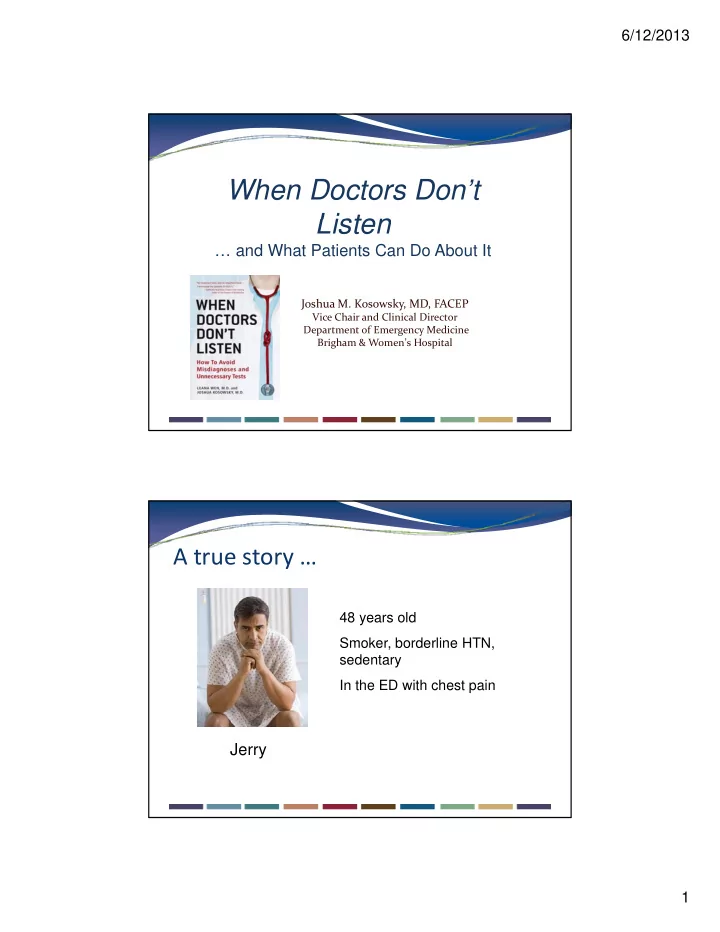

6/12/2013 When Doctors Don’t Listen Listen … and What Patients Can Do About It Joshua M. Kosowsky, MD, FACEP Vice Chair and Clinical Director Department of Emergency Medicine Brigham & Women ’ s Hospital A true story … 48 years old Smoker, borderline HTN, sedentary In the ED with chest pain Jerry 1
6/12/2013 Does diagnosis matter? Centuries ‐ old debate over whether diagnosis Centuries old debate over whether diagnosis or treatment is more important No one questions that the right treatment depends on the correct diagnosis Most of our quality measures assume that diagnosis is right in the first place diagnosis is right in the first place Misdiagnosis Incidence of misdiagnosis estimated to be 10% to 20% 1 Among malpractice claims, diagnostic errors are the g p , g most common, most costly and most dangerous An estimated 500,000 missed diagnostic opportunities occur each year in the U.S. at primary care visits alone 1 Schiff et al 2 found that 28 percent of diagnostic errors reported anonymously by doctors were life ‐ threatening or resulted in death or permanent disability Leape et al 3 estimated that diagnostic errors account for Leape et al estimated that diagnostic errors account for 40,000 to 80,000 deaths per year 2
6/12/2013 An “ orphan ” issue Largely unrepresented in the current quality framework National Quality Strategy focuses almost exclusively on management In IOM report To Err Is Human , the phrase medication error is used 70 times while diagnostic error occurs twice Lack of obvious solutions Wrong ‐ site surgery and wrong ‐ dose medication errors are amenable to systems solutions (time ‐ outs, computerized order entry, etc.) Diagnostic errors seem intensely personal: the system appears to Diagnostic errors seem intensely personal: the “ system ” appears to be the physician, and his or her own knowledge, skills, values, and behaviors General tendency to perceive that diagnostic errors are made by someone else (someone less careful or skillful!) Lack of data No national or system ‐ wide campaign to collect accurate data on diagnostic error g Doctors often don't know they've gotten it wrong Diagnostic errors are a leading cause of malpractice litigation, but the vast majority do not result in legal action Difficulty understanding and measuring diagnostic errors Little evidence that decision ‐ support tools actually reduce diagnostic error diagnostic error 3
6/12/2013 Roots of the problem Growing complexity of medicine Increasing fragmentation of the health ‐ care system Increasing fragmentation of the health care system Relentless time pressures Excessive reliance on electronic data Expensive, high ‐ tech tests supplanting traditional hands ‐ on skills of physical diagnosis Learning by algorithm rather than by time ‐ honored Learning by algorithm rather than by time ‐ honored apprenticeship model Solutions Medical education Interventions to improve physician knowledge and p p y g experience (simulation training, improved feedback) Improve clinical reasoning and decision ‐ making skills (critical thinking, meta ‐ cognition training) Change in healthcare delivery systems Financial incentives for safer, higher ‐ quality diagnosis Patient ‐ focused interventions f d Improved communication: 80% (or more) of diagnosis is predicated upon patient history 4
6/12/2013 Something patients can do … 8 Pillars to Better Diagnosis #1. Tell your whole story Provide narrative, not just a list of symptoms Use chronology and context Share your impressions Express your concerns Practice makes perfect Practice makes perfect 5
6/12/2013 #2. Participate in your diagnosis Think of diagnosis as a journey rather than a destination Ask what your doctor is thinking Understand the concepts of “ differential diagnosis ” and “ working diagnosis ” #3. Understand what tests are for Every test should be done for a specific reason Every test has potential harms Ask: What are we looking for? How will the results change things? How will the results change things? What are the alternatives? 6
6/12/2013 #4. Get answers before you leave Come prepared with questions: What is my diagnosis? What can I expect? What can I do to get better? What are some warning signs to watch for? g g If something doesn’t seem right, ask! Back to Jerry … Reassured about chest pain Understands his cardiac risk Motivated to improve his health 7
6/12/2013 Conclusions Avoiding misdiagnosis is critical to quality Avoiding misdiagnosis is critical to quality outcomes Doctors cannot rely exclusively on technology or algorithmic reasoning Patients can and should be encouraged to take an active role in the diagnostic process References 1. Saber Tehrani AS, et al.. 25 ‐ Year summary of US malpractice , 5 y p claims for diagnostic errors 1986 ‐ 2010: an analysis from the National Practitioner Data Bank. BMJ Qual Saf. 2013 Apr 22 2. Schiff GD, et al. Diagnostic error in medicine; analysis of 583 physician ‐ reported errors. Arch Intern Med. 2009;169(20):1881. 3. Leape L, Berwick D, Bates D. Counting deaths from medical errors [letter reply]. JAMA . 2002;288:2405 8
6/12/2013 Questions? Joshua M. Kosowsky, MD, Department of Emergency Medicine Brigham & Women’s Hospital jmkosowsky@partners.org www.whendoctorsdontlisten.com 9
Recommend
More recommend